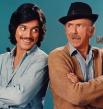Last week was Poetry Week over at
verb-ops. Since I am almost pathologically addicted to Vanx's site (I'm getting quite an art education; I highly recommend you take a look), I check in and comment regularly.
The other day, he posted a
lovely poem by Patrick Kavanagh and one of his readers commented that s/he wished s/he "understood poetry better." This got me thinking and here's what I've come up with:
I've always liked poetry, but not in the way that I think many of my English teachers wanted me to - at least not how many of my college English teachers wanted, anyway. To this day, I can't define, off the top of my head, what constitutes iambic pentameter or what enjambment means (though it SOUNDS like something one would wish to avoid, doesn't it?). I don't really care about how skillfully someone can choose words to fit into a specific meter or know how to count stresses in lines of verse. What I care about is how a poem speaks to me.
One of my favorite quotes about the study of poetry comes from "
Response and Analysis; Teaching Literature in Junior and Senior High School" by Robert E. Probst:
The poem gives each of us an opportunity to look at ourselves, putting our ideas and our attitudes into perspective. The poem is, in a sense,
something that we create as we read. (my emphasis) We bring to the text our understanding of the words, our expectations of the behavior of people, our ingrained biases and predilections, and from them create the experience that becomes for us the poem.
I'm in love with the idea that each of us creates poetry as we read. Perhaps more than any other belief, the idea that we all come to our experiences - in literature and everything else - with our own set of expectations, beliefs, histories and personalities and create meaning from those facets of ourselves is a concept that guides and informs my teaching practice. I am very mindful that every student is going to see something slightly different in every literary experience that I provide in my classroom, and I strive to be aware that, beyond the dictionary meaning of the words themselves, each student is going to create meaning from the words that they will (hopefully) integrate into themselves; something that they can store away and use later to help them make meaning of another new experience.
One of the things that alternately thrills and annoys the crap out of me about language is the way in which it can convey meaning that transcends the words on the page. The ineffable - that which we feel and know in the deepest recesses of our being but cannot adequately express with mere words, is one of the reasons I so love what I do. What makes the ineffable so fascinating to me is my understanding that something that speaks profoundly to me may not move you at all, even though we may have similar beliefs or experiences to bring to the interpretation of the words on the page. I offer, as evidence, the following line from
Justice Jackson's opening statement in the Nuremberg Nazi war crimes tribunal:
The wrongs which we seek to condemn and punish have been so calculated, so malignant, and so devastating, that civilization cannot tolerate their being ignored, because it cannot survive their being repeated.
This collection of words speaks so eloquently, to me anyway, that I've been turning them over and over in my head for about two weeks now (one of my freshman classes is watching the
TNT production of the trials, and I went to the web to look up Jackson's entire speech because I was so enthralled by Alex Baldwin's delivery of just a few words of Jackson's seventy-five page statement). They call up so much more than the idea of war crimes or concentration camps or any of the things about which Jackson was specifically referring. The words, for me, anyway, also evoke the idea of humanity as a whole banding together to protect the weak and helpless, of the belief that we have a profound responsibility to the future, and the idea that even the most horrendous of criminals must be treated with fairness and justice lest we - civilization - descend into the same behavior we seek to punish in the first place. All that, and much more, are transmitted to my by those thirty two little words.
For me, that's poetry: words put together in such a way that they constitute more than just words. Poetry, in my view, has little to do with stanzas and meter and enjambment (whatever that is) and everything to do with feeling and depth and ineffability. It's not a matter of whether or not you "like" poetry or whether or not you "get" poetry - what matters is whether or not you recognize poetry when
you see it.
Poetry is not an all-or-nothing proposition, though many people have been wrongly given that impression by some overzealous English teachers. You may not like a particular poem because there's nothing in your experience that you can use to relate to it and you know what? That's okay! I, personally, can't STAND Jabberwocky. Hate it, absolutely despise it! I'm not particularly wild about a lot of the English Romantic poets, either, though some of the pieces really do work for me. My "thing" as an English teacher is to try to get my students to understand that poetry has to be taken one poem at a time, and to recognize that a frustrating experience with one poem shouldn't dissuade them from poetry altogether.
To finish this line of thinking - at least for tonight - I leave you with one of my favorite poems and a little story to go along with it:
I have this "thing" about darkness. In most literary settings, the idea of darkness is used to imply danger or despair or fear; it's a symbol whose implications are almost always negative. I have a hard time seeing it that way, though; I'm very comfortable in the dark and always have been. I'm not sure what it is about me that makes this true, but it is. Anyway, one afternoon I got into a pretty heated conversation with a classmate of mine in a poetry class in college. We were reading this poem - one of my favorites - and this classmate had decided that the poem was about a criminal escaping after committing a terrible crime. While I was able to see where his interpretation would make sense, the poem has always held for me a kind of gentle quietude, the impression that the speaker, like me, is comfortable in the dark. Both of our interpretations are "right."
And yours is, too.
Acquainted with the Nightby: Robert Frost
I have been one acquainted with the night.I have walked out in rain -- and back in rain.I have outwalked the furthest city light.I have looked down the saddest city lane.I have passed by the watchman on his beatAnd dropped my eyes, unwilling to explain.I have stood still and stopped the sound of feetWhen far away an interrupted cryCame over houses from another street,But not to call me back or say good-bye;And further still at an unearthly height,One luminary clock against the skyProclaimed the time was neither wrong nor right.I have been one acquainted with the night.From "New Hampshire", 1923













